Hard Floor Cleaning in Kitchen Cleaning
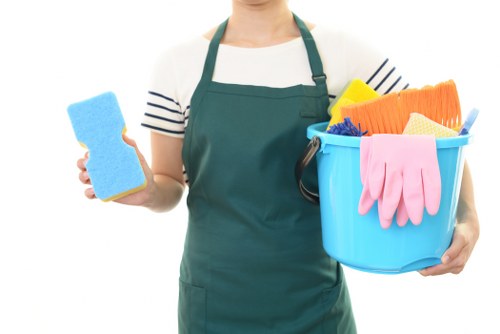
Maintaining clean hard floors in your kitchen is essential not only for aesthetic appeal but also for hygiene and safety. Kitchens are high-traffic areas where spills, stains, and debris are common, making regular floor cleaning a necessity.
Different types of hard flooring, such as tile, hardwood, laminate, and vinyl, require specific cleaning techniques to ensure they remain in good condition. Understanding the best practices for each material can extend the lifespan of your kitchen floors and keep them looking pristine.
In this article, we will explore comprehensive strategies for hard floor cleaning in kitchen cleaning, including choosing the right cleaning products, employing effective techniques, and maintaining your floors to prevent damage and wear.
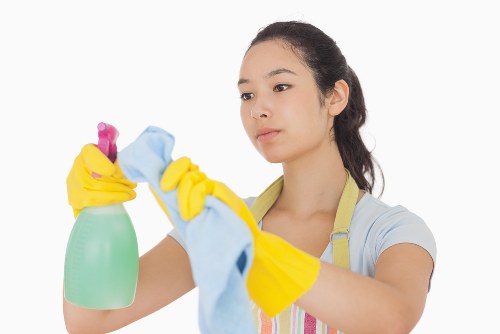
Why Regular Hard Floor Cleaning is Important
Regular cleaning of your kitchen's hard floors offers several benefits:
- Hygiene: Removing dirt, grease, and bacteria reduces the risk of illness.
- Safety: Clean floors prevent slips and falls caused by spills or debris.
- Longevity: Proper maintenance extends the life of your flooring materials.
- Appearance: Clean floors enhance the overall look and feel of your kitchen.
Neglecting floor maintenance can lead to permanent stains, scratches, and other damage that may require costly repairs or replacements.
Implementing a regular cleaning schedule is key to reaping these benefits and keeping your kitchen a pleasant and safe environment.
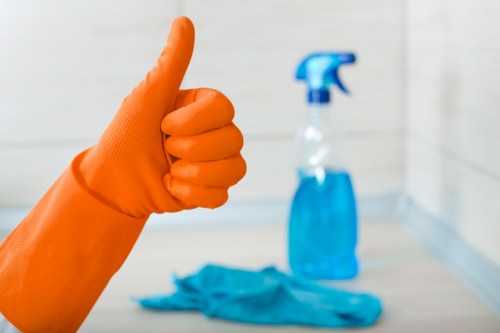
Types of Hard Floors and Their Cleaning Methods
Tile Floors
Tile flooring is a popular choice for kitchens due to its durability and ease of maintenance. To clean tile floors effectively:
- Sweep or vacuum regularly to remove loose dirt and debris.
- Mop with a mixture of warm water and a mild detergent.
- Use a grout cleaner for stubborn stains between tiles.
- Avoid harsh chemicals that can damage the grout or tile surface.
Grout Care
Grout is particularly susceptible to staining and requires special attention. Using a steam cleaner or a mixture of vinegar and baking soda can help maintain clean and bright grout lines.
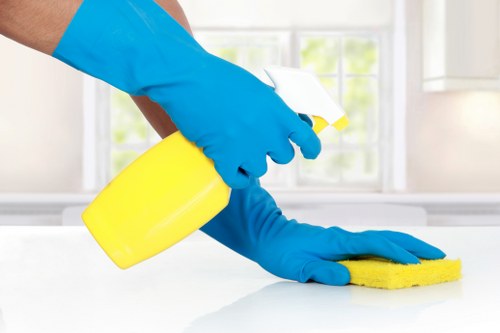
Hardwood Floors
Hardwood floors add warmth and elegance to any kitchen but require careful cleaning to prevent damage:
- Sweep or vacuum frequently to prevent scratches from dirt and grit.
- Mop with a damp (not wet) cloth using a hardwood-specific cleaner.
- Wipe up spills immediately to avoid water damage and staining.
- Avoid using excessive water or abrasive cleaners that can strip the finish.
Protective Measures
Using mats and area rugs can protect hardwood floors from spills and heavy foot traffic. Additionally, applying a sealant periodically can help maintain the wood's appearance and durability.
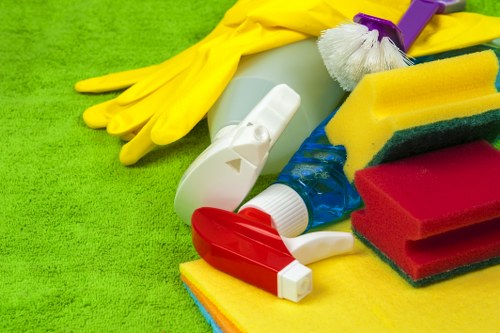
Laminate Floors
Laminate flooring is favored for its affordability and ease of installation. To keep laminate floors looking their best:
- Regularly sweep or vacuum to remove dust and debris.
- Mop with a solution of water and a laminate-safe cleaner.
- Ensure the mop is only damp, as excess moisture can cause swelling.
- Use protective pads on furniture to prevent scratches.
Handling Stains
For stubborn stains, a mixture of vinegar and water can be effective. Avoid abrasive tools that may damage the laminate surface.
Vinyl Floors are another common hard flooring option in kitchens. Similar to laminate, they require regular sweeping and appropriate mopping techniques to maintain their appearance.
Vinyl Floors
Vinyl flooring is known for its resilience and ease of maintenance. To clean vinyl floors properly:
- Sweep or vacuum to eliminate dirt and grit.
- Mop with a mixture of warm water and a mild detergent.
- Avoid using abrasive cleaners or tools that can scratch the surface.
- Promptly address spills to prevent staining.
Choosing the Right Cleaning Products
Selecting the appropriate cleaning products is crucial for effective hard floor cleaning in kitchen cleaning. Different flooring materials respond better to specific types of cleaners:
- Tile and Grout: Use pH-neutral cleaners to preserve the integrity of the grout and tiles.
- Hardwood: Opt for cleaners specifically formulated for wood to avoid damaging the finish.
- Laminate: Use gentle, non-abrasive cleaners to prevent scratching.
- Vinyl: Mild detergents work best to maintain the surface without causing deterioration.
Eco-Friendly Options
For those seeking environmentally friendly solutions, there are numerous eco-friendly cleaning products available that effectively clean hard floors without harsh chemicals.
Homemade Cleaners
Creating your own cleaning solutions using ingredients like vinegar, baking soda, and essential oils can be both cost-effective and safe for your floors.
Proper Ventilation is important when using cleaning products to ensure a safe and healthy kitchen environment.
Effective Cleaning Techniques
Mopping
Mopping is a fundamental technique for hard floor cleaning in the kitchen:
- Use a microfiber mop to effectively capture dirt and debris.
- Employ a figure-eight motion to cover more surface area.
- Rinse the mop frequently to avoid spreading dirt.
- Dry the floor immediately after mopping to prevent water damage.
Spot Cleaning
Addressing stains and spots promptly ensures that they do not set into the flooring material. Use appropriate cleaners based on the type of stain and flooring.
Scrubbing
For tougher stains, scrubbing may be necessary. Use non-abrasive scrubbers to avoid damaging the floor surface.
Steam Cleaning
Steam cleaning is an effective method for deep cleaning hard floors. It sanitizes surfaces without the need for chemical cleaners, making it a great option for eco-conscious households.
Machine Use Steam cleaners can save time and effort, especially in larger kitchens with extensive flooring.
Preventing Common Issues
Scratch and Damage Prevention
Taking preventive measures can significantly reduce the risk of scratches and damage to your kitchen floors:
- Use protective pads under furniture legs.
- Implement a no-shoes policy to minimize dirt and grit.
- Clean spills immediately to prevent staining and warping.
- Avoid dragging heavy objects across the floor.
Regular Maintenance
Incorporating routine maintenance into your cleaning schedule helps maintain the floor's appearance and functionality.
Dealing with Spills and Stains
Spills are inevitable in kitchen settings. Quick and proper handling is essential:
- Blot the spill with a clean cloth to absorb excess liquid.
- Apply the appropriate cleaner based on the spill type.
- Rinse the area thoroughly to remove any residue.
- Dry the floor to prevent moisture-related issues.
Tools and Equipment for Hard Floor Cleaning
Having the right tools can make hard floor cleaning in kitchen cleaning more efficient and effective:
- Mops: Choose between traditional, microfiber, or steam mops based on your cleaning needs.
- Brooms and Dustpans: Essential for sweeping up debris before mopping.
- Vacuum Cleaners: Useful for deep cleaning and reaching tight corners.
- Scrub Brushes: Ideal for tackling grout and stubborn stains.
Eco-Friendly Tools
Opting for sustainable cleaning tools, such as bamboo mops or reusable microfiber cloths, can reduce environmental impact.
Storage Solutions
Organizing your cleaning supplies helps streamline the cleaning process and ensures that everything is readily accessible when needed.
Quality Matters Investing in high-quality cleaning tools can save time and enhance the effectiveness of your hard floor cleaning routine.
Maintaining Clean Plates
Regular maintenance involves more than just daily cleaning. It includes periodic deep cleaning and preventive measures:
- Deep Cleaning: Schedule intensive cleaning sessions to remove built-up grime and restore floor shine.
- Sealing: For floors like tile and grout, applying a sealant can protect against stains and moisture.
- Regular Inspections: Check for any signs of damage or wear and address them promptly.
Avoiding Common Mistakes
Some common cleaning mistakes can damage your kitchen floors. These include using excessive water, applying harsh chemicals, or neglecting regular maintenance.
Proper Technique
Adhering to the correct cleaning techniques for your specific flooring type prevents unnecessary wear and extends the floor's lifespan.
Consistency is Key Maintaining a consistent cleaning schedule ensures that your hard floors remain in excellent condition year-round.
Advanced Cleaning Solutions
Eco-Friendly Cleaners
Eco-friendly cleaning solutions are gaining popularity due to their reduced environmental impact and safer use around the home:
- Biodegradable detergents that break down naturally.
- Plant-based cleaning agents free from harsh chemicals.
- Reusable cleaning tools that minimize waste.
Natural Ingredients
Ingredients like lemon juice, vinegar, and essential oils can effectively clean hard floors without compromising safety.
Technological Innovations
Modern advancements have introduced various tools and products that enhance the hard floor cleaning process:
- Robot Cleaners: Automated devices that handle daily cleaning tasks.
- Smart Mops: Equipped with sensors and app connectivity for optimized cleaning.
- Advanced Steam Cleaners: Offering higher temperatures and more efficient sanitation.
Smart Home Integration
Integrating cleaning devices with smart home systems allows for seamless and convenient maintenance of your kitchen floors.
Future Trends The cleaning industry continues to innovate, offering more effective and sustainable solutions for hard floor cleaning in kitchen cleaning.
Hiring Professional Cleaning Services
While DIY cleaning is feasible, hiring professional hard floor cleaning services can provide superior results:
- Professionals have access to specialized equipment and high-quality cleaning products.
- They possess expertise in handling various flooring types and addressing specific issues.
- Professional cleaning can save you time and effort, allowing you to focus on other tasks.
- Regular professional maintenance can extend the lifespan of your floors.
Choosing the Right Service
When selecting a professional cleaning service, consider the following:
- Experience and expertise in hard floor cleaning.
- Use of eco-friendly and safe cleaning products.
- Customer reviews and testimonials.
- Competitive pricing and service packages.
Customized Cleaning Plans
Many professional services offer tailored cleaning plans to meet the specific needs of your kitchen floors, ensuring optimal results.
Book Your Service Now to experience the difference professional hard floor cleaning can make in your kitchen.
Preventive Maintenance Tips
Preventive maintenance is essential for keeping your kitchen floors in top condition:
- Use Doormats: Place mats at entrances to reduce the amount of dirt and moisture entering your kitchen.
- Implement a Spill Protocol: Develop a habit of cleaning spills immediately to prevent stains and damage.
- Regularly Inspect Flooring: Check for any signs of wear, scratches, or damage and address them promptly.
- Rotate Furniture: Moving furniture periodically prevents uneven wear and potential scratches.
Seasonal Cleaning
Adjust your cleaning routine based on seasonal changes. For instance, more frequent cleaning might be necessary during winter months when moisture from cooking can accumulate.
Proper Ventilation
Ensuring your kitchen is well-ventilated helps prevent moisture buildup, which can damage certain types of hard floors.
Stay Proactive with your cleaning and maintenance efforts to enjoy beautiful and functional kitchen floors for years to come.
Conclusion
Hard floor cleaning in kitchen cleaning is a vital aspect of maintaining a healthy and aesthetically pleasing home. By understanding the specific needs of your flooring type, choosing the right cleaning products, and employing effective techniques, you can ensure your kitchen floors remain spotless and durable.
Investing time and effort into regular maintenance not only enhances the appearance of your kitchen but also contributes to a safer and more comfortable living environment.
Contact us today to learn more about our professional hard floor cleaning services and keep your kitchen floors looking their best.